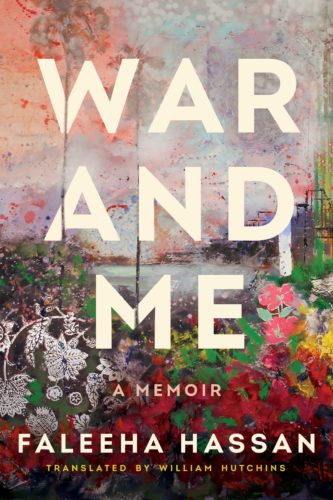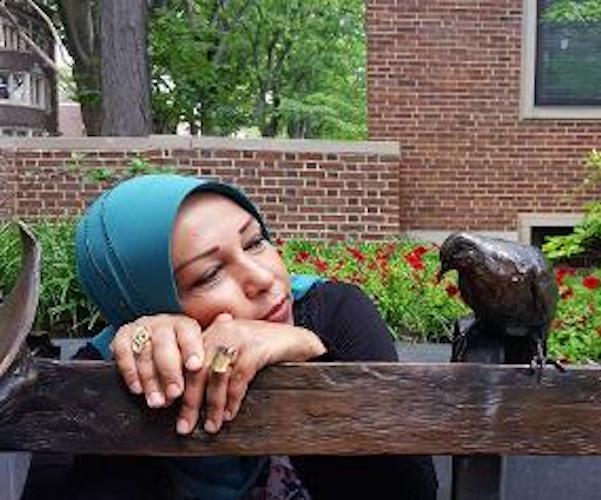Book Review: “War and Me: A Memoir” — A Poignant Tale of Survival
By Sarah Osman
Faleeha Hassan’s assessment of the damage America caused — through the ‘good intentions’ of regime change — may surprise many who depended on the mainstream media to learn about what happened in Iraq.
War and Me: A Memoir by Faleeha Hassan. Translated by William Hutchins. Amazon Crossing, 364 pages, $24.95.

Novels about the horrors of war are perennially popular. The “holocaust” genre, despite some ethical concerns, has inspired multiple bestsellers. Somewhat less prized are non-fiction books about war written by those who directly experienced it. In Faleeha Hassan’s memoir, War and Me, she recounts what life was like during the Iran-Iraq war and goes into the heinous aftermath of the conflict. This is not your standard war story. Hassan details what life was like for her and her family, Iraqis struggling to maintain a some sort of day-to-day existence as combat raged around them.
It is that narrative distance from bombs going off or ongoing atrocities that makes War and Me such an interesting read. Hassan even pushes aside fears that her father will not return from the front lines. She’s a teenager, and a young suitor slyly leaves her notes and even arranges for his mother to drop off a beautiful gift. It’s hard not to adore Hassan’s new gentleman caller and to share her anger when he suddenly disappears for two months. He later reveals that he’s been at the front. And then the tragic conclusion to the romance — Hassan’s suitor is killed during a battle, a shock that rattles her to her core. The innocence of first love is shattered by the harsh reality of living in a dictatorship during wartime.
Hassan and her family are deeply affected by the war, but she still obtains an education and works as a teacher. She eventually joins a group of prominent writers and artists, where she has the chance to discuss books and philosophy. With the help of a few of her fellow intellectuals, she even publishes a volume of poetry. Unfortunately, she has to deal with attacks by misogynists who dismiss her poetry because they are incensed that a woman published a book. (Thankfully, a writer from Baghdad manages to shut some of that nonsense down fast.) Despite the death and destruction around her, Hassan lives her life the best she can. She makes a terrible mistake and steps into a trap: she marries a horrid man with an even more horrific mother. Hassan’s handling of her marriage is a testament to her strength of character — as well as a not-so-veiled criticism of the hypocritical expectations put on “good” Arabic girls.
Hassan’s memoir also undercuts many stereotypes about her country. For instance, she critiques the idea that Iraqi women are subservient; Hassan is brave, stubborn, and is determined to pursue her own career. Her family is supportive of her education and generally help each other. Her father is the polar opposite of her husband: he’s kind, caring, and does his best to keep up his family’s morale.
As for politics, Hassan is not afraid to assess how destructive America’s economic embargo of Iraq was to the lives of the Iraqi population. Those who should have been punished weren’t, while most Iraqis civilians could not maintain comfortable lives. Many struggled to feed themselves and their families, even if they were working multiple jobs. Hassan never criticizes the U.S. government directly: she simply presents evidence of how the decisions made in Washington did more harm to the local population than the fat cats in the Iraqi government. Her straightforward look at the damage America caused — through the ‘good intentions’ of regime change — may surprise many who depended on the mainstream media to learn about what happened in Iraq.

Faleeha Hassan. Photo: courtesy of the author.
Hassan is a poet and, at its best, her prose resonates with the strengths of traditional Arabic verse. Unfortunately, here and there William Hutchins’ translation seems to have missed the nuances. Some of the sentences here are uncomfortably robotic.
War and Me might have used more self-reflection. Hassan takes an emotional approach to her experiences, but she tempers her observations with a wise reserve. This is a powerful memoir about the resilience of the human spirit that conveys a country’s misery without indulging in its terrors.
Sarah Mina Osman is a writer residing in Wilmington, NC. In addition to writing for the Arts Fuse, she has written for Watercooler HQ, Huffington Post, HelloGiggles, Young Hollywood, and Matador Network, among other sites. Her work was included in the anthology Fury: Women’s Lived Experiences in the Trump Era. She is currently a first year fiction MFA candidate at the University of North Carolina Wilmington. When she’s not writing, she’s dancing, watching movies, traveling, or eating. She has a deep appreciation for sloths and tacos. You can keep up with her on Twitter and Instagram: @SarahMinaOsman

As among the first Americans to get to know Faleeha Hassan, I am privileged to have the opportunity to personally hear some of these stories before they were written. I was in awe before and having read her life story, I remain in awe as to her vivid descriptions of life in Iraq under Saddam Hussein. She is truly a remarkable woman having endured such hardships. Her writing is so good that a movie should be made from this book! Today, I know her as a kind and gentle person with a remarkable way with words that has me spellbound with the amazing happenings in her life.
War and Me is a truthful and poignant account of the tragedies of war. For all of us far removed from such an experience, Faleeha Hassan brings us closer to it with every passage of her memoir. War and Me is more than one woman’s account of war, it’s a testament of her triumph over it.